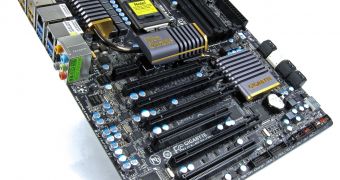MicroCenter, one of the largest brick and mortar computer retailers in the US, has started announcing customers who bought Sandy Bridge motherboards from their stores that the company plans to replace all affected products once Intel ships the new revision of the Cougar Point chipset.
According to the TechReport website, e-mails were sent to customers that purchased Intel 6-series motherboards from MicroCenter department stores to inform them of the issue.
“Please be assured that Micro Center will stand behind every customer who purchased a system or a motherboard from us that features this chipset
“Intel has already made the necessary change in the manufacturing process to correct the error, and properly functioning replacements will be available in approximately 8 weeks,” reads the e-mail entitled "Important Information Regarding Your Recent Intel 2nd Generation Core Processor Purchase."
The estimated eight-week delay would mean that the new motherboards, based on the B3 stepping, should arrive at the beginning of April.
Asus and Gigabyte have also announced the same timeframe for their revised boards.
However, the date may prove to be a little optimistic considering that 8 million motherboards have been affected by this issue.
As we previously reported, the cause of the bug is in one of the transistors in the 3Gbps PLL clocking tree which was provided with too high a voltage when the PCH chip was designed.
This resulted in a higher than expected leakage current which can increase over time, leading to the failure of the four 3Gbps SATA ports found inside the P67/H67 chipsets.
To resolve the issue, Intel has decided to remove the voltage delivered to the problematic transistor all together, thus requiring a new metal spin, dubbed the B3 revision.
Intel has allocated $700 million for the replacement of the affected components that have already reached the market.

 14 DAY TRIAL //
14 DAY TRIAL //